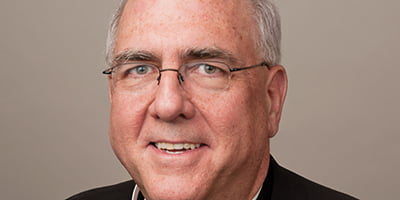by Archbishop Joseph F. Naumann
Recently, Pope Francis has announced that he is convening an extraordinary Synod of Bishops who will meet Oct. 5-19, 2014. The theme of the synod is: Pastoral Challenges of the Family in the Context of Evangelization.
For those of you who are as old as I am, you will remember the Second Vatican Council. An ecumenical council is a gathering of all the Catholic bishops of the world convened by the pope to advise the Holy Father on matters pertaining to the governance and pastoral mission of the church. As you can well imagine, the logistics alone for such a gathering are very complicated. For this reason, such councils are extremely rare.
Synods are also convened by the Holy Father, but they are a much smaller gathering of bishops. Usually, synods are composed of representatives chosen by national bishops’ conferences, as well as bishops chosen by the Holy Father because of their special knowledge, wisdom and expertise. For most
of the synods, the United States, because of its size, is asked to send five representatives. Extraordinary synods, such as the one being convened for next October, are usually smaller with just the presidents of the bishops’ conferences representing the church in their part of the world.
Before a synod, every bishop in the world is given the opportunity to make suggestions about the framework and the agenda of the synod. Bishops receive a questionnaire from the Council for the Synod of Bishops asking us to respond to specific questions that will help shape the working document that will be the framework for deliberations at the synod.
Recently, I received the questionnaire for next October’s extraordinary synod, which I have been asked to complete by the end of the year and forward to the staff at the U. S. Conference of Catholic Bishops, which will have the task of collating all of the responses by the bishops of the United States and forwarding a summary to Archbishop Lorenzo Baldisseri, the general secretary for the Synod of Bishops. Bishops are asked to consult as widely as possible within the time frame allotted, to assist us in the formulation of our responses to the questionnaire.
There has been a certain amount of confusion about the process. Some bishops have conducted online surveys inviting everyone to respond to the specific questions on the questionnaire. Some have interpreted this to mean that the Holy Father wants to conduct a plebiscite on matters of doctrine regarding marriage and family life.
In this Leaven and on our website, you will find the entire questionnaire. You will see that the questions are not designed for a poll. They are actually essay questions that each bishop is obliged to answer after having consulted as broadly as possible with the clergy, religious and laity of his diocese. We all are part of families. Many of you are living the vocation of Christian marriage, which is a call to heroic love and you know firsthand the joys and challenges of parenthood.
I invite every person in the archdiocese to read carefully the full questionnaire (see page 3) and to share with me your responses to any or all of the questions. I also want to propose some questions based on those
in the questionnaire. Your responses to these questions will be helpful to me as I write my own response to the questionnaire.
AB1) What are the cultural obstacles today that make it difficult for married couples to embrace and live their vows that commit them to a love that is faithful, fruitful, and permanent?
AB2) What did you find helpful in the church’s marriage preparation program? How could the church’s marriage preparation process be improved and made more helpful?
AB3) How and when do you pray as a family? What have you found most helpful in your efforts to pray as a family? What are the most difficult obstacles to family prayer?
AB4) What has your parish or the archdiocese provided that has been most helpful in strengthening your marriage? What could the church provide to support and strengthen marriages?
AB5) Why do so many couples choose to cohabitate (live together) rather than marry? Why do fewer couples choose to marry in the church?
AB6) Jesus himself taught the permanence of marriage and rejected divorce and remarriage. How can the church remain faithful to Our Lord’s teaching and be compassionate toward those who are divorced and remarried?
AB7) What has been your own experience of the annulment process? What has been the experience of family or friends who have sought an annulment of their marriage? How could the annulment process be improved? How do you understand the difference between divorce and annulment?
AB8) Do you understand why the church opposes the recognition by the state of so-called same-sex marriage? How could the church minister more effectively
to individuals experiencing same-sex attractions?
AB9) What could the church do to present more effectively her teaching on the immorality of contraception vs. openness to children and the moral use of natural family planning? What makes the church’s teaching regarding contraception so difficult for couples to accept? How can the church better foster a greater generosity in couples regarding openness to life?
Thanks for pondering and praying over these questions. Please send your responses and suggestions to: Rose Hammes, Communications & Planning, Catholic Church Offices, 12615 Parallel Pkwy., Kansas City, KS 66109 or email them to: rhammes@archkckc.org. Please send your responses and suggestions by Dec. 9.
In addition to the responses that I receive from individuals, I will be consulting with the pastoral council of the archdiocese (composed of lay representatives from each of the regions of the archdiocese), the priests’ council, the marriage and family life staff, and others who assist with our ministry to couples and families. All of this input will assist me in formulating input for the synod. Thanks for your prayers and suggestions. Come Holy Spirit!


